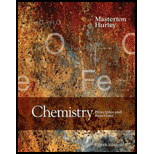
(a)
Interpretation:
To determine the type of aqueous reaction for the following:
Concept introduction:
A strong acid gives hydrogen ion/s in the aqueous solution, it has the tendency to gets completely ionized into its constituent ions in a solution containing water. On the other hand, a weak acid is the one which will partially dissociate in water or in an aqueous solution. Similarly, a weak base gives hydroxide ion/s in the aqueous solution and has the tendency to partially dissociate in water, while a strong base is the one which gets completely dissociated in water.
(b)
Interpretation:
To determine the type of aqueous reaction for the following:
Concept introduction:
A strong acid gives hydrogen ion/s in the aqueous solution, it has the tendency to gets completely ionized into its constituent ions in a solution containing water. On the other hand, a weak acid is the one which will partially dissociate in water or in an aqueous solution. Similarly, a weak base gives hydroxide ion/s in the aqueous solution and has the tendency to partially dissociate in water, while a strong base is the one which gets completely dissociated in water.
(c)
Interpretation:
To determine the type of aqueous reaction for the following:
Concept introduction:
A strong acid gives hydrogen ion/s in the aqueous solution, it has the tendency to gets completely ionized into its constituent ions in a solution containing water. On the other hand, a weak acid is the one which will partially dissociate in water or in an aqueous solution. Similarly, a weak base gives hydroxide ion/s in the aqueous solution and has the tendency to partially dissociate in water, while a strong base is the one which gets completely dissociated in water.
(d)
Interpretation:
To determine the type of aqueous reaction for the following:
Concept introduction:
A strong acid gives hydrogen ion/s in the aqueous solution, it has the tendency to gets completely ionized into its constituent ions in a solution containing water. On the other hand, a weak acid is the one which will partially dissociate in water or in an aqueous solution. Similarly, a weak base gives hydroxide ion/s in the aqueous solution and has the tendency to partially dissociate in water, while a strong base is the one which gets completely dissociated in water.
(e)
Interpretation:
To determine the type of aqueous reaction for the following:
Concept introduction:
A strong acid gives hydrogen ion/s in the aqueous solution, it has the tendency to gets completely ionized into its constituent ions in a solution containing water. On the other hand, a weak acid is the one which will partially dissociate in water or in an aqueous solution. Similarly, a weak base gives hydroxide ion/s in the aqueous solution and has the tendency to partially dissociate in water, while a strong base is the one which gets completely dissociated in water.
Want to see the full answer?
Check out a sample textbook solution
Chapter 4 Solutions
Chemistry: Principles and Reactions
- The temperature on a sample of pure X held at 1.25 atm and -54. °C is increased until the sample boils. The temperature is then held constant and the pressure is decreased by 0.42 atm. On the phase diagram below draw a path that shows this set of changes. pressure (atm) 2 0 0 200 400 temperature (K) Xarrow_forwardQUESTION: Answer Question 5: 'Calculating standard error of regression' STEP 1 by filling in all the empty green boxes *The values are all provided in the photo attached*arrow_forwardpressure (atm) 3 The pressure on a sample of pure X held at 47. °C and 0.88 atm is increased until the sample condenses. The pressure is then held constant and the temperature is decreased by 82. °C. On the phase diagram below draw a path that shows this set of changes. 0 0 200 temperature (K) 400 аarrow_forward
- er your payment details | bar xb Home | bartleby x + aleksogi/x/isl.exe/1o u-lgNskr7j8P3jH-1Qs_pBanHhviTCeeBZbufuBYT0Hz7m7D3ZcW81NC1d8Kzb4srFik1OUFhKMUXzhGpw7k1 O States of Matter Sketching a described thermodynamic change on a phase diagram 0/5 The pressure on a sample of pure X held at 47. °C and 0.88 atm is increased until the sample condenses. The pressure is then held constant and the temperature is decreased by 82. °C. On the phase diagram below draw a path that shows this set of changes. pressure (atm) 1 3- 0- 0 200 Explanation Check temperature (K) 400 X Q Search L G 2025 McGraw Hill LLC. All Rights Reserved Terms of Use Privacy Cearrow_forward5.arrow_forward6.arrow_forward
 Chemistry: Principles and PracticeChemistryISBN:9780534420123Author:Daniel L. Reger, Scott R. Goode, David W. Ball, Edward MercerPublisher:Cengage Learning
Chemistry: Principles and PracticeChemistryISBN:9780534420123Author:Daniel L. Reger, Scott R. Goode, David W. Ball, Edward MercerPublisher:Cengage Learning General Chemistry - Standalone book (MindTap Cour...ChemistryISBN:9781305580343Author:Steven D. Gammon, Ebbing, Darrell Ebbing, Steven D., Darrell; Gammon, Darrell Ebbing; Steven D. Gammon, Darrell D.; Gammon, Ebbing; Steven D. Gammon; DarrellPublisher:Cengage Learning
General Chemistry - Standalone book (MindTap Cour...ChemistryISBN:9781305580343Author:Steven D. Gammon, Ebbing, Darrell Ebbing, Steven D., Darrell; Gammon, Darrell Ebbing; Steven D. Gammon, Darrell D.; Gammon, Ebbing; Steven D. Gammon; DarrellPublisher:Cengage Learning Chemistry & Chemical ReactivityChemistryISBN:9781133949640Author:John C. Kotz, Paul M. Treichel, John Townsend, David TreichelPublisher:Cengage Learning
Chemistry & Chemical ReactivityChemistryISBN:9781133949640Author:John C. Kotz, Paul M. Treichel, John Townsend, David TreichelPublisher:Cengage Learning Chemistry: Principles and ReactionsChemistryISBN:9781305079373Author:William L. Masterton, Cecile N. HurleyPublisher:Cengage Learning
Chemistry: Principles and ReactionsChemistryISBN:9781305079373Author:William L. Masterton, Cecile N. HurleyPublisher:Cengage Learning Introduction to General, Organic and BiochemistryChemistryISBN:9781285869759Author:Frederick A. Bettelheim, William H. Brown, Mary K. Campbell, Shawn O. Farrell, Omar TorresPublisher:Cengage Learning
Introduction to General, Organic and BiochemistryChemistryISBN:9781285869759Author:Frederick A. Bettelheim, William H. Brown, Mary K. Campbell, Shawn O. Farrell, Omar TorresPublisher:Cengage Learning Chemistry: The Molecular ScienceChemistryISBN:9781285199047Author:John W. Moore, Conrad L. StanitskiPublisher:Cengage Learning
Chemistry: The Molecular ScienceChemistryISBN:9781285199047Author:John W. Moore, Conrad L. StanitskiPublisher:Cengage Learning





